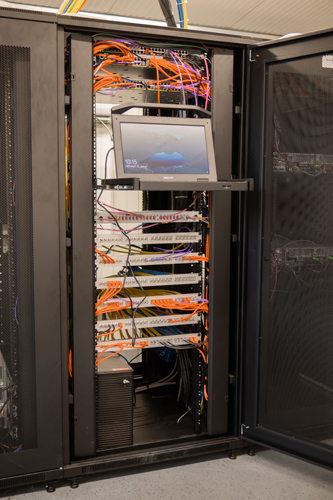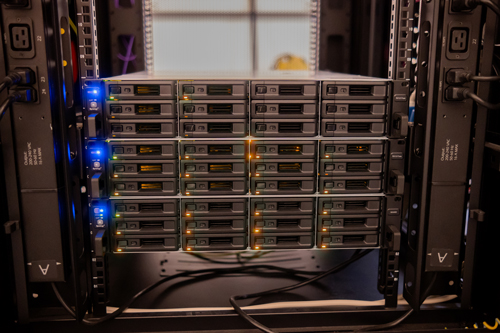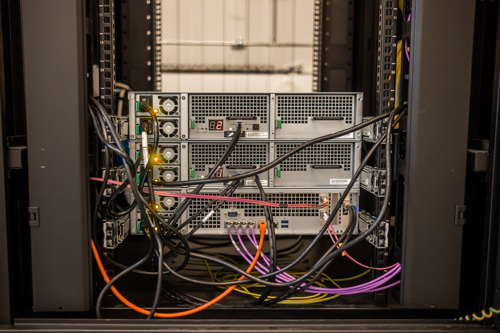The network and types
Networks are the result of several devices exchanging data with each other. Data can be exchanged both locally and globally. Various hardware components and software protocols are required to ensure the reliable sending as well as receiving of data. Three basic components are routers, switches and servers. While the router directs data packets across the network and the switch connects the devices within the network, the server provides the services and data. The network users can be connected to each other via cable or radio technology. Depending on the size of the network, meaning the number of devices that exchange data with each other, data is divided into different network types.
The three main types are:
LAN
WAN
VPN
LAN or local area network is a physically limited network into which at least two devices must be integrated. Such devices can be computers, laptops, printers or even storage devices, which can be set up either via cable or wireless. Wireless LAN networks are also known as WLAN - this type of network is mainly used in home and company networks.
A wide area network, or WAN for short, is a network that covers a large geographical area. Individual computers or smaller networks, such as LANs, can also be connected to each other. WANs are mainly used to connect company locations in different countries.
The VPN (virtual private network) is a virtual, protected and enclosed communication network. It is used, for example, to grant remote employees access to the company network.
The administration, implementation, maintenance and control of such networks is the responsibility of each company's network management. The complexity of the networks and internal operating procedures as well as external conditions constantly confront IT departments with new challenges - including our IT admins.

Challenges and how we coped with them
Pandemic
The pandemic turned the world of network admins upside down. One lockdown followed another, the central work location shifted to people's homes and distributed working led to increased cyber security risks. Topics such as network capacity and server load were also becoming increasingly important for IT administrators. How did we deal with these issues?
Erek: "They required a scaling of our VPN infrastructure and the guarantee of a secure, stable internet connection for our employees. We also had to adapt our IT security strategies to deal with increased cybersecurity risks resulting from the decentralized work."
Remote work and a growing number of employees
The more employees a company has, the more complex the data traffic becomes, as more devices need to be integrated into the network. In particular, the increase of remote working due to the pandemic is challenging network capacity, server utilization and data security. In order to guarantee all employees equal access to the same resources and applications, adapting our security strategies has become increasingly important. With almost 100 employees, it certainly wasn't that easy, was it?
Erek: "With action and the lessons learned from past problems, we were able to address workload peaks, for example by creating scaling options within the servers from the start. [...] We doubled our servers for the terminal server operation of employees working from home and equipped it with a graphics card to cope with the loads and calculations of all our employees working remotely."

Economic crisis
The energy crisis and the high level of inflation are leading to rising prices. On top of this, there are the supply bottlenecks and chip shortages that have emerged during the pandemic. This has had and continues to have an impact on the acquisition of network components. Refurbished goods are a more cost-effective and environmentally friendly alternative. Companies can also become more resistant to fluctuations in chip supply by choosing refurbished technology.
Erek: "...we also equipped our server rooms with refurbished routers, switches and servers."
Diversity of end devices
The diversity of the devices increases not only due to the technologization of work steps and processes, but also with the number of employees. Today, networks must be able to integrate a variety of devices. At the same time, the network's systems and applications must function efficiently and securely on the devices. Network administrators must therefore constantly integrate new devices into the system. How have we responded to the many different devices our colleagues use?
Erek: „By replacing and expanding some switches. This also includes improving and upgrading our firewall solution. With these measures, we were able to ensure more efficient management of data traffic inside and outside the company, as well as improved data security. Redundant firewalls, for example, enabled increased reliability and load distribution."
Digitization
Erek: "Digitalization itself involves a constant need to innovate and adapt. We must remain agile in order to keep pace with rapidly changing technologies while ensuring user-friendliness".
As a result, digitalization increases the complexity of networks. However, the motto "Never change a running system" does not apply here. Instead, the opportunities offered by digitalization should be used!


Future challenges - what might await us
Expanding companies and advancing digitalization require IT infrastructures to be constantly scalable. The amount of data to be processed and secured is also constantly increasing, making continuous network optimization necessary. Added to this is the growing flood of cyber threats. From phishing to ransomware, network security management is constantly faced with new attack techniques and must adapt its systems accordingly. The integration of artificial intelligence and automated processes into existing systems will require new solutions. At the same time, they are also likely to play a decisive role in increasing the efficiency and innovation of network systems. Challenge accepted right Erek?
Erek: "The future challenges in the field of network management, be it the advancing digitalization, employee growth, increasing data volumes or even cyber threats, are undoubtedly demanding. Yet I am confident that we will be able to overcome these challenges with our flexibility, willingness, inventiveness and team spirit. I believe that our continuous willingness to innovate, our flexibility and our commitment to security and efficiency are key characteristics that are already helping us to adapt to these challenges today. Thanks to our proactive approach and our small but strong team, I am confident that we will continue to be successful in the future and will be able to meet the upcoming challenges in our IT with confidence."
Summary
Network admins face diverse and dynamic challenges. About the pandemic, remote working, increasing employee numbers, the economic situation, the growing diversity of end devices and advancing digitalization. They all require adaptive solutions and forward thinking. Especially with a future-oriented view, security precautions and network structures must be continuously expanded.
As a strong partner and pioneer in the sustainable IT industry, we are here to support you. You can find affordable and refurbished network components such as routers, switches and servers for setting up a reliable network in our online store. To prevent long downtimes of your IT systems due to cyberattacks and similar, we also have effective firewalls in our portfolio. Do you need support? Our sales team will be happy to help you with any questions or requests.
